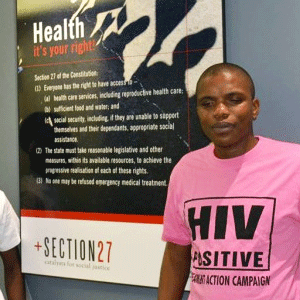
Where are the voices of the patients at the Competition Commission’s Market Inquiry into the Private Health Care Sector? asked Section 27’s lawyers, Tim Fish Hodgson and Sher-Muhammad Khan at a workshop held on 23 May in the NGO’s Braamfontein offices.
And do you have a concern that should be heard? If so, now is the time to speak up.
The mandate of the Inquiry is to look into the general state of competition in the sector, to figure out how we can achieve accessible, affordable, quality private health care in South Africa. While we’ve all seen a lot of coverage of appalling failures in the public sector, the huge flaws in the private sector have received less interrogation.
The healthcare market is not an ordinary market like any other, the two lawyers stressed. Asymmetrical information is endemic to the sector – you as a patient do not and cannot have access to the information your doctor holds, and you probably don’t understand what your medical scheme plan offers and withholds – this tends to skew the power away from the patient.
Read: Advocate urges litigation over PMBs
But two things really make this sector vitally different from ordinary commercial markets: at the point of purchase – the moment where you are standing in emergency deciding to ‘purchase’ admission to hospital for your screaming child, for example – the buyer is more often than not in a position of extreme vulnerability: these decisions are about wellbeing, even life and death, and in that moment you are severely vulnerable, unable to make the informed decision from a position of choice and rationality that is expected of buyers in a market.
Added to that is the fact that the health care sector, unlike commercial markets, is governed by the supreme law of the land, the constitution, which, in Section 27, makes the “right to health” a right citizens are entitled to.
This also confers human rights obligations on the corporations engaged in providing healthcare, Hodgson pointed out.
As the Section 27 submission to the Inquiry notes, “…in choosing to operate in these markets, most on a for-profit basis, participants in the private health care sector accept not only moral obligations but also the constitutional obligations attendant to realisation of the right to access to health care services.”
Read: 25 chronic conditions your scheme must cover
Where is the patient?
The intersection between this marketplace and human rights, human stories and human vulnerabilities is why it’s crucial that the voice of patients is heard at the Inquiry, Hodgson and Khan said. This is not simply an exercise in investigating the dynamics of a market-place; it should clearly be patient-centred and have a human rights frame.
And yet few of the 67 submissions that have been made to the Commission centre on the patient, says Hodgson and Khan, which is why it’s become crucial to call to hear more from the people who are medical scheme members and patients, who are directly affected by the practices under scrutiny here.
Section 27 has gathered as many patient stories as possible to accompany its submission to the Commission, and Khan outlined some of them, showing how a strictly commercial approach to health care can lead to gross injustices – such as the older woman who needed a hip replacement (this is categorised as a PMB, or Prescribed Minimum Benefit, subject to regulations in terms of which medical schemes are obliged to pay ‘in full’).
Read: Are Prescribed Minimum Benefits on their way out?
The wording of the PMB says that the prosthetic (the artificial joint) and ‘medical management’ must be paid for, so her medical scheme said they’d pay for those things – but not the necessary operation to get the joint into her hip.
Failure to pay for PMBs is one of the top complaints laid with the Council for Medical Schemes, which is tasked with protecting the interests of the public, and it has ruled that literal interpretations of PMB regulations such as this are not acceptable – but medical schemes continue to attempt to escape paying PMB claims by all and any means, the lawyers say.
Only about eight million South Africans use the private health care sector as their main or only health service, but many of these citizens are troubled about what some refer to as a ‘broken system’. If you have a special concern or a story that illustrates that brokenness, Section 27 urges you to come forward with it.
There is still plenty of time, as the workshop delegates were informed that public hearings, due to be held in the middle of 2015, are now unlikely to happen before early 2016.
This is your chance
To make a contribution you could approach the Commission directly at ccsa@compcom.co.za or via Section 27 at healthinquiry@section27.org.za.
Tell us your story on Facebook
You can also tell us your experience and disappointments with the Public Health Sector on our Facebook page. We will submit selected comments and stories to the relevant medical aid on your behalf for response. Or, email us at community@health24.com
Read more:
SA medical service providers are overcharging
Know your scheme's PMBs
Syndicates Taking Medical Schemes for Ride in South Africa




 Publications
Publications
 Partners
Partners














